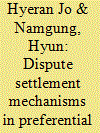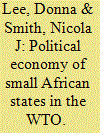| Srl | Item |
| 1 |
ID:
115729


|
|
|
|
|
| Publication |
2012.
|
| Summary/Abstract |
Preferential trade agreements (PTAs) have increased dramatically in the past several decades and play an important role in the global economy. Dispute settlement mechanisms (DSMs) in these international agreements significantly influence their functioning. In this article, the authors seek to understand what factors determine the legal arrangements of these mechanisms. The authors argue that the confluence of domestic political regime type, emulation incentives, and the development of the multilateral trade regime determines their legal dimension. Using a data set of PTAs between 1957 and 2008, the authors show that (1) democracies are more likely than autocracies to prefer moderately strict DSMs, (2) trading partners increasingly emulate each other by adopting similar legal templates, and (3) the recent trend against legalistic mechanisms is largely driven by the development of the multilateral trade regime. Their findings have important implications for the design of international institutions by highlighting the importance of member-specific as well as macro-level factors.
|
|
|
|
|
|
|
|
|
|
|
|
|
|
|
|
| 2 |
ID:
081298


|
|
|
|
|
| Publication |
2008.
|
| Summary/Abstract |
Small states have come to play an increasingly active part in multilateral trade negotiations in the World Trade Organization (WTO) such that small state activism has been a major contributory factor in the continuing delay in concluding the Doha Development Agenda (DDA) negotiations. This suggests that small states are no longer bit players and are instead key actors in the WTO. Through the formation of a range of alliances, small developing states have become central to the process and form of multilateral trade negotiations. In this article we highlight this increasing activism of small states through a study of the DDA cotton negotiations. We focus in particular on the activism and influence of four small developing African states; Burkina Faso, Benin, Chad and Mali in the negotiations. In order to explore whether size really 'matters' in the WTO system, our study demonstrates that while size has some relevance-since it creates unequal deliberative capacities-the major obstacle to effective influence is the persistence of protectionist policies in the cotton sector and the inability of the WTO to enforce its own liberal trade rules and obligations
|
|
|
|
|
|
|
|
|
|
|
|
|
|
|
|